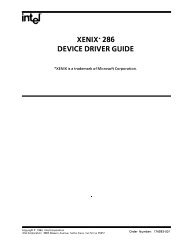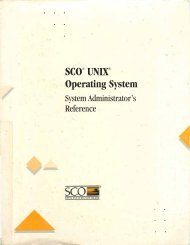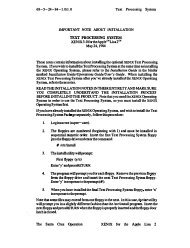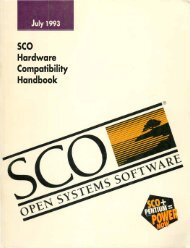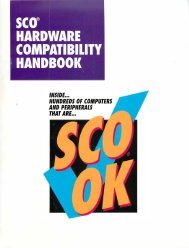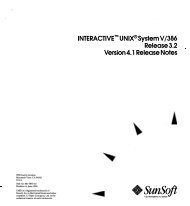- Page 2 and 3:
©1986, 1985 AT&T All Rights Reserv
- Page 4 and 5:
Important Information, Version 3.51
- Page 6 and 7:
Important Information, Version 3.51
- Page 8 and 9:
Important Information, Version 3.51
- Page 10 and 11:
Important Information, Version 3.51
- Page 12 and 13:
Windowing Software, Version 3.51 --
- Page 14 and 15:
Windowing Software, Version 3.51 --
- Page 16 and 17:
Document Preparation, Version 3.51
- Page 18 and 19:
Document Preparation, Version 3.51
- Page 20 and 21:
Document Preparation, Version 3.51
- Page 22 and 23:
Document Preparation, Version 3.51
- Page 24 and 25:
Document Preparation, Version 3.51
- Page 26 and 27:
APPENDIX A: Document Preparation, V
- Page 28 and 29:
APPENDIX A: Document Preparation, V
- Page 30:
APPENDIX B: Document Preparation, V
- Page 35 and 36:
470(1) 470( 1) NAME 470 - filters n
- Page 37 and 38:
478(1) ESC-s ESC-U ESC-u ESC-W ESC-
- Page 39 and 40:
BRK(2) BRK(2) NAME brk, sbrk - chan
- Page 41 and 42:
COL( l) COL( l) NAME col - filter r
- Page 43 and 44:
CONVERT( I) CONVERT( I) NAME conver
- Page 45 and 46:
EQNCHAR(S) EQNCHAR(S) NAME eqnchar
- Page 47 and 48:
FX (1) FX(l) NAME fx - filters nrof
- Page 49 and 50:
HPU(l) HPU( 1) NAME hplj -filters n
- Page 51 and 52:
ISMPX(l) ISMPX(l) NAME ismpx - retu
- Page 53 and 54:
JWIN( l) NAME SYNOPSIS jwin jwin -p
- Page 55 and 56:
KTUNE(7) nclist npbuf ncall nttyhog
- Page 57 and 58:
LAYERS (l) LAYERS (!) NAME layers -
- Page 59 and 60:
LAYERS (l) LAYERS (l) SEE ALSO sh(l
- Page 61 and 62:
LAYERS (5) LAYERS (5) identical to
- Page 63 and 64:
MACREF(l) MACREF( l) NAME macref -
- Page 65 and 66:
MAN( l) 478-12 478-18 479 479-12 47
- Page 67 and 68:
MAN(S) MAN(S) NAME man - macros for
- Page 69 and 70:
MAN(S) MAN(S) The final example is
- Page 71 and 72:
MM(1) 475-17 478 478-12 478-18 479
- Page 73 and 74:
MM(S) MM(S) NAME mm - the mm macro
- Page 75 and 76:
NDX{l) NDX( l) NAME ndx - create a
- Page 77 and 78:
NEQN(l) NEQN(l) NAME neqn - format
- Page 79 and 80:
NROFF(1) NROFF( 1) NAME nroff - tex
- Page 81 and 82:
NROFF (l) NROFF( l) FILES /usrllib/
- Page 83 and 84:
NTERM(S) NTERM(S) Em size of an em
- Page 85 and 86:
PTX (l) PTX( l) NAME ptx - make per
- Page 87 and 88:
SUBJ(l) SUBJ(l) NAME subj -generate
- Page 89 and 90:
TBL(1) TBL( 1) Full details of all
- Page 91 and 92:
XT(7) JAGENT XT(7) may return the e
- Page 93 and 94:
XTS(lM} XTS(lM} NAME SYNOPSIS xts [
- Page 95 and 96:
LOCKING ( 2 ) LOCKING ( 2 ) NAME lo
- Page 99 and 100:
PREFACE The AT&T UNIX System V Us e
- Page 101 and 102:
Preface ckeckall(lM) This command i
- Page 103 and 104:
profiler(lM) pwck(lM) qasurvey(lM)
- Page 105 and 106:
nc(7) nsc(7) phone(7) phonedvr(7) p
- Page 107 and 108:
cpio(l) ct(l) ctrace(l) cu(l) diD(
- Page 109 and 110:
ld(l) lint(l) ls(l) machid(l) mailx
- Page 111 and 112:
spell( I) stlogin(l) ststat(l) time
- Page 113 and 114:
atan(3f) atan2(3f) atoj(3c) bool(3f
- Page 115 and 116:
mclock(3f) min(3f) menu(3t) message
- Page 117 and 118:
x25hlnk(3c) x25£pvc(3c) Section 4:
- Page 119 and 120:
TABLE OF CONTENTS 1. Comman ds and
- Page 121 and 122:
Table of Contents mm o o o o o prin
- Page 123 and 124:
Table of Contents fcntl . . file co
- Page 125 and 126:
Table of Contents hypot • • •
- Page 127 and 128:
ua • utmp 5. Miscellaneous Facili
- Page 129 and 130:
PERMUTED INDEX /functions of HP 264
- Page 131 and 132:
� \ paste: paste buffer utilities
- Page 133 and 134:
stdipc: standard interprocess commu
- Page 135 and 136:
file. delta: make a delta (change)
- Page 137 and 138:
getenv: return value for environmen
- Page 139 and 140:
ldohseek: seek to the optional file
- Page 141 and 142:
cpio: format of cpio archive. dir:
- Page 143 and 144:
getpw: get name rrom UID. . • set
- Page 145 and 146:
abort: generate an semaphore set or
- Page 147 and 148:
passwd: change login password. sett
- Page 149 and 150:
operations. msgctl: message control
- Page 151 and 152:
split: split a file into channel. t
- Page 153 and 154:
generate e program cross reference.
- Page 155 and 156:
stream. setbuf: assign buffering to
- Page 157 and 158:
� Permuted Index /strcmp, strncmp
- Page 159 and 160:
tsort: topologica.l sort. • . .
- Page 161 and 162:
display editor based on/ vi, view:
- Page 163:
INTRO ( 1) INTRO ( l ) NAME intro -
- Page 166 and 167:
300 ( 1 ) 300 ( 1 ) for C programs,
- Page 168 and 169:
\�
- Page 170 and 171:
I I I I I I I I I I I I I I I I I I
- Page 172 and 173:
ADB ( 1 ) ADB (l) sr, and usp. symb
- Page 174 and 175:
ADB ( 1} ADB (l} " ••• " 0 Pr
- Page 176 and 177:
ADB ( 1) ADDRESSES b d e m 8 t The
- Page 178 and 179:
ADMIN ( 1) -t[name] -fflag b ADMIN(
- Page 180 and 181:
ADMIN(l) ADMIN(l) make deltas (chan
- Page 182 and 183:
( � � . · � .
- Page 184 and 185:
AR(l) AR (I) X Extract the named fi
- Page 186 and 187:
AS (l) (AT&T UNIX PC Only ) AS (I)
- Page 188 and 189:
·� · ·. rl · (1
- Page 191 and 192:
AWK (l) AWK (l) NAME awk - pattern
- Page 193:
AWK (l) AWK(l) Add up first column,
- Page 196 and 197:
f) .. .... ._ __ . ·
- Page 198 and 199:
I� �� I J
- Page 200 and 201:
BC(l) BC (l) l(x) log a(x) arctange
- Page 203 and 204:
BDIFF(l) BDIFF ( 1 ) NAME bdiff - b
- Page 205 and 206:
BFS (I) BFS(I) NAME bfs - big file
- Page 207 and 208:
BFS (l) BFS (l) could be used to ma
- Page 209:
CAL ( 1) CAL(l) NAME cal - print ca
- Page 212 and 213:
' ..
- Page 215 and 216:
;� CC ( l ) cc (1) NAME cc - C co
- Page 217:
CC(l) /lib/crts.o /lib/mcrto.o /lib
- Page 221 and 222:
CDC ( 1 ) CDC { 1) NAME cdc - chang
- Page 223:
CDC (l) CDC (l) SEE ALSO admin( l),
- Page 226 and 227:
CFLOW ( 1) CFLOW ( 1) produces the
- Page 228 and 229:
CFONT(l) (AT&T UNIX PC only ) CFONT
- Page 231:
CHOWN (l) CHOWN ( 1) NAME chown, ch
- Page 234 and 235:
.'�
- Page 236 and 237:
I I I I I I I I I I I I I I I I I I
- Page 238 and 239:
COL(l) COL(l) BUGS Cannot back up m
- Page 240 and 241:
COMB(l) COMB(l) FIT..ES s.COMB The
- Page 243 and 244:
CP ( 1) CP ( 1) NAME cp, In, mv - c
- Page 245 and 246:
CPIO ( 1 ) CPIO ( 1) NAME cpio - co
- Page 247:
CPIO ( 1) CPIO ( 1) track of them a
- Page 250 and 251:
CPP ( 1) CPP (1) Two special names
- Page 253 and 254:
CRYPT { l ) ( Domestic Version Only
- Page 255 and 256:
CSPLIT ( 1) CSPLIT (l) NAME csplit
- Page 257 and 258:
CU ( lC ) CU ( lC ) NAME cu - call
- Page 259:
CU(lC) CU ( lC ) BUGS Cu buffers in
- Page 262 and 263:
CUT ( 1) CUT(l) DIAGNOSTICS line to
- Page 264 and 265:
CW(l) CW (l) .OW Start of text to b
- Page 266 and 267:
CW (l) CW (l) Documents that contai
- Page 268 and 269:
.� .• \ __ }
- Page 270 and 271:
DATE(l) DATE(l) DIAGNOSTICS No perm
- Page 272 and 273:
DC( 1) DC (1) x =x The top two elem
- Page 275 and 276:
DD ( 1 ) DD ( 1) NAME dd - convert
- Page 277 and 278:
� I DELTA ( l ) DELTA (I) NAME de
- Page 279 and 280:
DELTA ( 1) DELTA (!) WARNINGS Lines
- Page 281:
DEROFF (l) DEROFF (l) NAME derofi -
- Page 284 and 285:
DIFF ( 1) DIFF ( 1) -e producing a
- Page 287:
DIFF3 ( 1 ) DIFF3 (1) NAME diff3 -
- Page 291:
DIRCMP ( 1) DIRCMP ( 1) NAME dircmp
- Page 295 and 296:
DUMP ( 1 ) DUMP(!) NAME dump - dump
- Page 297:
ECHO (l) ECHO (l) NAME echo - echo
- Page 300 and 301:
ED ( l ) ED {1) the RE. The REs all
- Page 302 and 303:
ED (l) ED (1) . 6. FILES below. A R
- Page 304 and 305:
ED ( 1 ) ED ( 1) command list is eq
- Page 306 and 307:
ED (1) ED (l) replaced by the repla
- Page 308 and 309:
ED (l) ED (1) FILES /tmp/e# tempora
- Page 311:
ENV ( 1) ENV(l) NAME env - set envi
- Page 314 and 315:
EQN(l) EQN( 1) [ • '+ � ] � l
- Page 316 and 317:
� I )
- Page 318 and 319:
EX (l) BUGS EX (l) The undo command
- Page 320 and 321:
EXPR(l) EXPR ( l ) 3. 4. returns th
- Page 323 and 324:
FC(l) ( AT&T UNIX PC only ) FC ( l
- Page 325:
FILE ( 1 ) FIT..E ( 1 ) NAME file -
- Page 328 and 329:
FIND ( 1 ) FIND ( 1 ) -print -cpio
- Page 330 and 331:
GET(l) -b -ilist -xlist GET(l) furt
- Page 332 and 333:
GET(l) GET(l) TABLE 1. Determinatio
- Page 334 and 335:
GET(l) GET(l) generated by the get.
- Page 337 and 338:
GETOPT ( 1) GETOPT ( l ) NAME getop
- Page 339:
GREEK (l) GREEK(l) NAME greek - sel
- Page 342 and 343:
GREP ( 1) GREP (1) The order of pre
- Page 344 and 345:
� '--- I I I I I I f)
- Page 346 and 347:
· r1 . .... .. ._ _ . . r1 ' ·
- Page 348 and 349:
HP(l) HP (1) is adjacent to an ASCl
- Page 351:
ID ( 1 ) ID ( 1) NAME id - print us
- Page 355 and 356:
IPCS ( 1) IPCS ( 1) NAME ipcs - rep
- Page 357 and 358:
IPCS ( 1 ) OWNER GROUP CREATOR CGRO
- Page 359 and 360:
JOIN ( 1 ) JOIN ( 1 ) NAME join - r
- Page 361:
KILL (I) KILL(l) NAME kill - termin
- Page 364 and 365:
KSH(l) KSH ( 1) A command is either
- Page 366 and 367:
KSH ( 1) KSH ( 1) The following exp
- Page 368 and 369:
KSH ( 1) KSH ( 1) ${parameter%patte
- Page 370 and 371:
KSH ( 1) KSH(l) with the parameter
- Page 372 and 373:
KSH ( 1) KSH(l) redirected using a
- Page 374 and 375:
KSH ( 1) KSH(l) variables whose sco
- Page 376 and 377:
KSH ( 1 ) KSH(l) Command Re-entry.
- Page 378 and 379:
KSH(l) KSH(l) using paper terminals
- Page 380 and 381:
KSH ( 1) KSH ( 1) [count]Tc Equival
- Page 382 and 383:
KSH ( 1) KSH(I) Line feed and print
- Page 384 and 385:
KSH ( 1 ) KSH ( 1) fc -e - [ old= n
- Page 386 and 387:
KSH ( 1 ) KSH(l) ?, the remainder o
- Page 388 and 389:
KSH (l) KSH(l) test [ expr ] Evalua
- Page 390 and 391:
KSH ( 1 ) KSH(l) ulimit [ -cdfmpt 1
- Page 393 and 394:
LD ( 1 ) LD (1) NAME ld - link edit
- Page 395:
LD ( 1 ) FILES LD ( 1) allow compat
- Page 398 and 399: LEX(l) LEX(l) EXAMPLE character def
- Page 401 and 402: LINT ( l ) LINT ( 1 ) NAME lint - a
- Page 403: LOGNAME ( l ) LOGNAME ( l ) NAME lo
- Page 406 and 407: I� �- '--- . ·
- Page 408 and 409: LP (l) LP (l) -ooption Specify prin
- Page 410 and 411: LPSTAT (l) LPSTAT (l) SEE ALSO enab
- Page 412 and 413: LS (l) LS (l) -f Force each argumen
- Page 415 and 416: M4 ( 1 ) M4 ( 1) NAME m4 - macro pr
- Page 417 and 418: M4 (1) undivert divnum dnl if else
- Page 419 and 420: MAIL ( 1) MAIL (l) NAME mail, rmail
- Page 421 and 422: MAKE(l) MAKE(l) NAME make - maintai
- Page 423 and 424: MAKE ( I) MAKE (l) MAKEFLAGS macro
- Page 425 and 426: MAKE(l) MAKE (I) .C .C - .Sh .sh- .
- Page 427 and 428: MAKE (l) MAKE (l) In the above exam
- Page 429 and 430: MAKEKEY (l) (Domestic Version Only
- Page 431 and 432: MESG ( 1) MESG ( 1) NAME mesg - per
- Page 433 and 434: MESSAGE( ! ) ( AT&T UNIX PC only )
- Page 435: MKDIR (l) MKDIR (l) NAME mkdir - ma
- Page 438 and 439: MM (l) HINTS MM (l) Mm reads the st
- Page 440 and 441: i�
- Page 442 and 443: MORE(l) MORE (l) stand-out mode, mo
- Page 444 and 445: MORE( I) MORE(l) The terminal is se
- Page 446 and 447: NEWFORM ( l ) -ck -pn -an NEWFORM (
- Page 451 and 452: NICE ( l ) NICE ( l ) NAME nice - r
- Page 453 and 454: NL(l) NL(l) NAME nl - line numberin
- Page 455 and 456: NM (l) NM (l) NAME nm - print name
- Page 457: NOHUP ( l ) NOHUP ( l ) NAME nohup
- Page 460 and 461: NROFF(l) NROFF(l) FILES BUGS (gener
- Page 462 and 463: i �'. l ' .·· I�
- Page 464 and 465: PACK(l) PACK(l) peat name.z or just
- Page 467 and 468: PASTE ( 1) PASTE(l) NAME paste - me
- Page 469: PATH ( l ) PATH ( l ) NAME path - l
- Page 472 and 473: PR {l) -ok -lk -h PR {l) Offset eac
- Page 474 and 475: PROF(l) PROF ( 1) SEE ALSO cc( l),
- Page 476 and 477: PRS(l) PRS(l) Keyfllord :Dt: :DL: :
- Page 478 and 479: I� '--
- Page 480 and 481: PS (l) PS (l) -g glist Restrict lis
- Page 483 and 484: � I PTX ( 1 ) PTX ( 1 ) NAME ptx
- Page 485: PWD ( 1) PWD (1) NAME pwd - working
- Page 488 and 489: � I ? / � '·---
- Page 491 and 492: RMDEL ( l ) RMDEL ( l ) NAME rmdel
- Page 493: SACT ( 1 ) SACT ( 1 ) NAME sact - p
- Page 497: SCRSET ( 1) ( AT&T UNIX PC only ) S
- Page 500 and 501:
SDB ( 1) SDB ( 1) An exception to t
- Page 502 and 503:
SDB ( 1 ) SDB ( 1) by the length sp
- Page 504 and 505:
SDB ( 1) SDB (I) finishes. linenumb
- Page 506 and 507:
SDB(l) SDB(l) V Print the version n
- Page 509 and 510:
� I SDIFF ( 1 ) SDIFF ( 1) NAME s
- Page 511 and 512:
SED ( 1 ) SED ( 1) NAME sed - strea
- Page 513:
SED ( 1) g p w wfile SED ( 1) Globa
- Page 516 and 517:
� · -_. _:
- Page 518 and 519:
SH ( 1 ) SH( 1) case word in [ patt
- Page 520 and 521:
SH(I) SH (I) The shell gives defaul
- Page 522 and 523:
SH (l) SH(l) TERM=450 cmd args and
- Page 524 and 525:
SH (l) -t -u shift [ n ] test times
- Page 526 and 527:
SH (l) SH (l) EXIT STATUS Errors de
- Page 528 and 529:
SHFORM(l) (AT&T UNIX PC only ) SHFO
- Page 530 and 531:
!�
- Page 532 and 533:
� ·--·
- Page 535 and 536:
SORT ( l ) SORT ( l ) NAME sort - s
- Page 537 and 538:
SPELL ( 1) SPELL (l) NAME spell, ha
- Page 539 and 540:
SPLIT ( 1) SPLIT ( 1) NAME split -
- Page 541:
STRIP ( 1 ) STRIP (1) NAME strip -
- Page 544 and 545:
STTY ( 1) ixon ( -ixon) ixa.ny ( -i
- Page 547 and 548:
SU ( 1) SU ( l ) NAME su - become s
- Page 549 and 550:
SUM ( 1 ) SUM ( 1) NAME sum - print
- Page 551 and 552:
SYNC ( 1) NAME sync - update the su
- Page 553 and 554:
TABS ( l ) TABS ( l ) NAME tabs - s
- Page 555 and 556:
TABS (l) TABS (l) unknown tab code
- Page 557:
TAIL ( l) TAIL ( 1) NAME tail - del
- Page 560 and 561:
TAR ( 1) TAR ( 1) FILES r causes ta
- Page 562 and 563:
TBL(l) TBL(l) If a data line consis
- Page 564 and 565:
It) I�
- Page 570 and 571:
� "'-·�r•'
- Page 572 and 573:
I I I I I I I I I I I I I I I I I I
- Page 574 and 575:
TEST ( 1) TEST (l) SEE ALSO find(l)
- Page 576 and 577:
:)\ ... .._
- Page 579:
TR ( l ) TR ( l ) NAME tr - transla
- Page 582 and 583:
I I I I I I I I I I I I I I I I I I
- Page 584 and 585:
TSET ( 1 ) (AT&T UNIX PC only ) TSE
- Page 587 and 588:
TTY ( l ) TTY ( l ) NAME tty - get
- Page 589 and 590:
UAHELP (l) (AT&T UNIX PC only ) UAH
- Page 591 and 592:
UAUPD ( l ) ( AT&T UNIX PC only ) U
- Page 593:
UMASK ( 1) UMASK ( 1) NAME umask -
- Page 596 and 597:
UMODEM ( 1 ) UMODEM ( 1 ) 7 Seven-b
- Page 598 and 599:
I�
- Page 601 and 602:
UNIQ(l) UNIQ ( 1) NAME uniq - repor
- Page 603:
UNITS ( l } UNITS ( l ) NAME units
- Page 606 and 607:
UUCP ( lC) UUCP ( lC ) -nuser Notif
- Page 608 and 609:
UUSTAT (IC) UUSTAT (lC) options -j,
- Page 610 and 611:
UUTO (lC) FILES PUBDm /usr fspoolfu
- Page 612 and 613:
UUX(lC} UUX(lC) Uux returns an ASCI
- Page 614 and 615:
VAL (l) bit 5 = SID does not exist;
- Page 616 and 617:
VC ( 1 ) VC (I) :asg keyword=value
- Page 619 and 620:
VI (l) VI (l) NAME vi, view - scree
- Page 621 and 622:
VI (l) fnj$ End of line fn}+ Next l
- Page 623 and 624:
� I VI ( I) [n}dd Moving Text "r
- Page 625 and 626:
VI (l) :e! file :e + name :e + n :n
- Page 627 and 628:
VI (l) VI ( 1) lisp (default: no li
- Page 629 and 630:
VI ( I ) VI (l) A requested tag is
- Page 631 and 632:
WAIT ( l ) WAIT ( l ) NAME wait - a
- Page 633 and 634:
WC (l) WC (l) NAME we - word count
- Page 635:
WHAT ( l ) WHAT ( l ) NAME what - i
- Page 638 and 639:
WHO (l) WHO(l) is the name of the p
- Page 641 and 642:
XARGS ( 1) XARGS ( l ) NAME xargs -
- Page 643:
XARGS ( 1) XARGS ( l ) The user is
- Page 646 and 647:
YACC ( 1) YACC (l) DIAGNOSTICS The
- Page 648 and 649:
INTRO ( 2) INTR0 (2) the appropriat
- Page 650 and 651:
INTR0 ( 2 ) INTR0 ( 2 ) 35 ENOMSG N
- Page 652 and 653:
INTR0 (2) INTR0 (2) The process's e
- Page 654 and 655:
INTRO ( 2) INTR0 (2) A semaphore is
- Page 656 and 657:
� :
- Page 659:
ACCT (2) ACCT (2) NAME acct - enabl
- Page 662 and 663:
I�
- Page 665:
CHDffi ( 2 ) CHDffi ( 2 ) NAME chdi
- Page 668 and 669:
CHMOD (2) CHMOD (2) RETURN VALUE Up
- Page 671:
CHROOT (2) CHROOT (2) NAME chroot -
- Page 674 and 675:
'�
- Page 676 and 677:
CREAT (2) CREAT (2) file descriptor
- Page 678 and 679:
·� '·-
- Page 680 and 681:
EXEC (2) EXEC (2) Envp is an array
- Page 683 and 684:
EXIT ( 2 ) EXIT (2) NAME exit, _exi
- Page 685 and 686:
FCNTL (2) FCNTL (2) NAME fcntl - fi
- Page 687:
FCNTL (2) FCNTL (2) [ENOLCK] Cmd is
- Page 690 and 691:
FORK(2) FORK(2) The system-imposed
- Page 693 and 694:
GETUID ( 2 ) GETUID ( 2 ) NAME getu
- Page 695 and 696:
IOCTL (2) IOCTL (2) NAME ioctl - co
- Page 697:
KILL(2) KILL(2) NAME kill - send a
- Page 701:
LSEEK ( 2) LSEEK ( 2 ) NAME )seek -
- Page 704 and 705:
MKNOD (2} MKNOD (2} RETURN VALUE Up
- Page 707 and 708:
MSGCTL ( 2 ) MSGCTL ( 2 ) NAME msgc
- Page 709 and 710:
MSGGET (2) MSGGET (2) NAME msgget -
- Page 711 and 712:
MSGOP (2) MSGOP (2) NAME msgop - me
- Page 713 and 714:
� I MSGOP {2) MSGOP {2) If (msgft
- Page 715:
NICE (2) NICE (2) NAME nice - chang
- Page 718 and 719:
OPEN ( 2) O_TRUNC O_EXCL OPEN(2) us
- Page 721 and 722:
PAUSE( 2 ) PAUSE( 2 ) NAME pause -
- Page 723:
PIPE( 2) PIPE ( 2) NAME pipe - crea
- Page 726 and 727:
� ' )
- Page 729 and 730:
PTRACE (2) PTRACE (2) NAME ptrace -
- Page 731 and 732:
PTRACE (2) PTRACE (2) GENERAL ERROR
- Page 733:
READ (2) READ (2) NAME read - read
- Page 736 and 737:
SEMCTL (2) SEMCTL (2) the correspon
- Page 738 and 739:
SEMGET (2) SEMGET (2) A semaphore i
- Page 740 and 741:
SEMOP (2) SEMOP (2) process's semad
- Page 742 and 743:
I I I I I I I I I I I I I I I I I I
- Page 745:
SETUID ( 2 ) SETUID ( 2 ) NAME setu
- Page 748 and 749:
SHMCTL (2) SHMCTL (2) to that of su
- Page 750 and 751:
SHMGET (2) SHMGET (2) physical memo
- Page 752 and 753:
SHMOP (2) SHMOP (2) Shmdt will fail
- Page 754 and 755:
SIGNAL (2) SIGNAL (2) SIG_DFL - ter
- Page 756 and 757:
SIGNAL (2) SIGNAL (2) When processi
- Page 758 and 759:
STAT(2) STAT (2) st_ctime Time when
- Page 760 and 761:
� . .... .. ._
- Page 762 and 763:
'� '---- ··
- Page 764 and 765:
SYSLOCAL ( 2) SYSLOCAL ( 2) SYSL_AL
- Page 767 and 768:
� I TIMES (2) TIMES (2) NAME time
- Page 769:
ULIMIT ( 2) ULIMIT (2) NAME ulimit
- Page 772 and 773:
� ··-·
- Page 774 and 775:
��
- Page 777:
UNLINK(2) UNLINK(2) NAME unlink - r
- Page 781:
,� UTIME(2) UTIME (2) NAME utime
- Page 784 and 785:
WAIT (2) WAIT (2) SEE ALSO exec(2),
- Page 786 and 787:
WRITE(2) WRITE (2) RETURN VALUE Upo
- Page 788 and 789:
INTR0 (3) INTR0 (3) SEE ALSO ar(l),
- Page 791:
ABORT ( 3C ) ABORT ( 3C ) NAME abor
- Page 795:
ASSERT (3X) ASSERT (3X) NAME assert
- Page 799 and 800:
BESSEL (3M) BESSEL (3M) NAME jO, j
- Page 801:
BSEARCH ( 3C ) BSEARCH ( 3C ) NAME
- Page 805 and 806:
CONV( 3C ) CONV ( 3C ) NAME toupper
- Page 807:
CRYPT (3C) (Domestic Version Only )
- Page 811 and 812:
CTIME ( 3C ) CTIME ( 3C ) NAME ctim
- Page 813:
CTYPE ( 3C ) CTYPE ( 3C ) NAME isal
- Page 816 and 817:
CURSES (3) no raw() overlay(winl,wi
- Page 818 and 819:
I�
- Page 820 and 821:
DIAL ( 3C ) DIAL ( 3C ) required. T
- Page 822 and 823:
DRAND48 ( 3C ) DRAND48 ( 3C ) a = 5
- Page 824 and 825:
� --- ·
- Page 827:
END ( 3C ) END ( 3C ) NAME end, ete
- Page 830 and 831:
� .._.·· ��. .... ._ _ _ /
- Page 832 and 833:
· '-... _ _ / . f) · (� "-- ·
- Page 835:
FCLOSE ( 3S ) FCLOSE ( 3S ) NAME fc
- Page 839:
FLOOR ( 3M ) FLOOR ( 3M) NAME floor
- Page 842 and 843:
FOPEN (3S) FOPEN (3S) may be used t
- Page 844 and 845:
FORM(3T) (AT&T UNIX PC only ) FORM
- Page 846 and 847:
FORM{3T) { }; (AT&T UNIX PC only )
- Page 848 and 849:
FORM(3T) (AT&T UNIX PC only ) FORM(
- Page 851:
FREXP ( 3C ) FREXP ( 3C ) NAME frex
- Page 855:
FTW(3C) FTW(3C) NAME ftw - walk a f
- Page 858 and 859:
�·. (
- Page 860 and 861:
I� i -� ·-
- Page 863:
GETENV (3C) NAME getenv - return va
- Page 866 and 867:
GETGRENT ( 3C ) GETGRENT ( 3C ) WAR
- Page 869 and 870:
GETOPT (3C) GETOPT (3C) NAME getopt
- Page 871:
GETP ASS ( 3C ) GETP ASS ( 3C ) NAM
- Page 874 and 875:
� ' ) '"- '
- Page 877 and 878:
GETPWENT ( 30 ) GETPWENT ( 30 ) NAM
- Page 879:
GETS ( 3S ) GETS ( 3S ) NAME gets,
- Page 882 and 883:
GETUT (3C) GETUT (3C) line-> ut_lin
- Page 884 and 885:
HSEARCH ( 3C ) HSEARCH ( 3C ) START
- Page 886 and 887:
I� ', ...____... .. � · � \
- Page 889 and 890:
LDAHREAD ( 3X ) LDAI-IREAD ( 3X ) N
- Page 891:
LDCLOSE ( 3X ) LDCLOSE ( 3X ) NAME
- Page 895:
LDLREAD ( 3X ) LDLREAD ( 3X ) NAME
- Page 898 and 899:
. \
- Page 900 and 901:
�� · ·. � ·
- Page 902 and 903:
LDOPEN(3X) LDOPEN(3X) example, one
- Page 904 and 905:
1 "� "
- Page 907 and 908:
LDSSEEK ( 3X ) LDSSEEK ( 3X ) NAME
- Page 909 and 910:
� LDTBINDEX ( 3X ) LDTBINDEX ( 3X
- Page 911 and 912:
LDTBREAD ( 3X ) LDTBREAD ( 3X ) NAM
- Page 913 and 914:
LDTBSEEK ( 3X ) LDTBSEEK ( 3X ) NAM
- Page 915 and 916:
("" LOCKF ( 3C ) LOCKF ( 3C ) NAME
- Page 917 and 918:
LOGNAME ( 3X ) LOGNAME ( 3X ) NAME
- Page 919 and 920:
LSEARCH ( 3C ) LSEARCH ( 3C ) NAME
- Page 921 and 922:
MALLOC (3C) MALLOC ( 3C ) NAME mall
- Page 923 and 924:
MA THERR (3M) MATHERR (3M) NAME mat
- Page 925 and 926:
MA THERR (3M) MA THERR (3M) ABBREVI
- Page 927 and 928:
MEMORY ( 3C ) MEMORY ( 3C ) NAME me
- Page 929 and 930:
MENU (3T) {AT&T UNIX PC only ) MENU
- Page 931 and 932:
MENU (3T) (AT&T UNIX PC only ) MENU
- Page 933 and 934:
MENU (3T) (AT&T UNIX PC only ) MENU
- Page 935 and 936:
MESSAGE ( 3T ) ( AT&T UNIX PC only
- Page 937:
MKTEMP ( 3C ) MKTEMP ( 3C ) NAME mk
- Page 941:
NLIST (3C) NLIST (3C) NAME nlist -
- Page 944 and 945:
PASTE (3T) (AT&T UNIX PC only ) PAS
- Page 946 and 947:
I I I I I I I I �\ I I I I I I I
- Page 949 and 950:
POPEN ( 3S ) POPEN ( 3S ) NAME pope
- Page 951 and 952:
PRINTF (3S) PRINTF (3S) NAME printf
- Page 953:
PRINTF (3S) PRINTF (3S) appears. Th
- Page 956 and 957:
PUTC (3S) PUTC (3S) BUGS the file s
- Page 959 and 960:
PUTPWENT ( 3C ) PUTPWENT ( 3C ) NAM
- Page 961 and 962:
PUTS ( 3S ) PUTS ( 3S ) NAME puts,
- Page 963 and 964:
QSORT (3C) QSORT (3C) NAME qsort -
- Page 965 and 966:
RAND ( 3C ) RAND ( 3C ) NAME rand,
- Page 967 and 968:
REGCMP (3X) REGCMP (3X) NAME regcmp
- Page 969 and 970:
SCANF ( 3S ) SCANF(3S) NAME scanf,
- Page 971:
SCANF(3S) SCANF(3S) , f , and g may
- Page 974 and 975:
I�
- Page 976 and 977:
I�
- Page 978 and 979:
� I J rj ---
- Page 980 and 981:
� ·· .. � '.---- -' · n
- Page 983:
SSIGNAL ( 3C ) SSIGNAL ( 3C ) NAME
- Page 987:
STDIPC ( 3C ) STDIPC ( 3C ) NAME st
- Page 990 and 991:
STRING (3C) STRING (3C) NOTE BUGS S
- Page 992 and 993:
·-- . ·
- Page 995 and 996:
SWAB ( 3C ) SWAB ( 3C ) NAME swab -
- Page 997 and 998:
SYSTEM ( 3S ) SYSTEM( 3S ) NAME sys
- Page 999 and 1000:
TAM (3T) (AT&T UNIX PC only ) TAM(3
- Page 1001 and 1002:
TAM(3T) (AT&T UNIX PC only ) TAM(3T
- Page 1003 and 1004:
TAM (3T) (AT&T UNIX PC only ) TAM(3
- Page 1005 and 1006:
TAM (3T) wgetpos() kcodemap() wgetc
- Page 1007 and 1008:
TMPFILE ( 3S ) TMPFILE ( 3S ) NAME
- Page 1009 and 1010:
TMPNAM (3S) TMPNAM (3S} NAME tmpnam
- Page 1011 and 1012:
TRACK ( 3T ) ( AT&T UNIX PC only )
- Page 1013:
TRACK (3T) (AT&T UNIX PC only ) TRA
- Page 1017 and 1018:
TSEARCH ( 3C ) TSEARCH ( 3C ) NAME
- Page 1019:
TSEARCH ( 3C ) } I* *I void TSEARCH
- Page 1023:
TTYSLOT ( 3C ) TTYSLOT ( 3C ) NAME
- Page 1026 and 1027:
()·-
- Page 1028 and 1029:
VPRINTF ( 3S ) VPRINTF ( 3S ) } SEE
- Page 1030 and 1031:
WIND (3T) (AT&T UNIX PC only ) WIND
- Page 1032 and 1033:
WRASTOP ( 3T ) (AT&T UNIX PC only )
- Page 1035 and 1036:
A_OUT ( 4 } A-OUT (4) NAME a.out -
- Page 1037 and 1038:
A.OUT ( 4) A.OUT (4) } AOUTHDR; Sec
- Page 1039:
�· \ A.OUT ( 4) A.OUT (4) SYSEMZ
- Page 1042 and 1043:
ADF ( 4 ) (AT&T UNIX PC only ) ADF(
- Page 1044 and 1045:
ADF ( 4 ) (AT&T UNIX PC only ) ADF
- Page 1046 and 1047:
ADF ( 4 ) (AT&T UNIX PC only ) ADF
- Page 1048 and 1049:
ADF (4) Format Comma Dollars and Ce
- Page 1050 and 1051:
ADF ( 4 ) (AT&T UNIX PC only ) ADF
- Page 1052 and 1053:
ADF ( 4 ) (AT&T UNIX PC only ) Keyw
- Page 1054 and 1055:
I�
- Page 1056 and 1057:
AR ( 4 ) AR (4) • The number of s
- Page 1059 and 1060:
CORE ( 4) CORE ( 4) NAME core - for
- Page 1061:
CPIO ( 4) CPIO ( 4) NAME cpio - for
- Page 1064 and 1065:
0 !:)
- Page 1067 and 1068:
FONT ( 4 ) (AT&T UNIX PC only ) FON
- Page 1069 and 1070:
FONT ( 4) (AT&T UNIX PC only ) FONT
- Page 1071 and 1072:
FS (4) FS (4) NAME file system - fo
- Page 1073 and 1074:
FS (4) FS (4) immaterial. The value
- Page 1075 and 1076:
FSPEC ( 4) FSPEC ( 4) NAME fspec -
- Page 1077 and 1078:
GETTYDEFS ( 4 ) GETTYDEFS ( 4) NAME
- Page 1079 and 1080:
GROUP ( 4) GROUP ( 4) NAME group -
- Page 1081 and 1082:
INITTAB { 4 ) INITTAB ( 4 ) NAME in
- Page 1083 and 1084:
INITT AB ( 4 ) INITT AB ( 4 ) FILES
- Page 1085 and 1086:
!NODE ( 4) NAME inode - format of a
- Page 1087:
ISSUE ( 4) ISSUE ( 4) NAME DESCRIPT
- Page 1090 and 1091:
LDFCN( 4) LDFCN ( 4) ldfhread(3X) r
- Page 1093:
LINENUM ( 4) LINENUM ( 4) NAME line
- Page 1096 and 1097:
MASTER ( 4) Field 1: Field 2: MASTE
- Page 1099 and 1100:
PASSWD ( 4 ) PASSWD ( 4 ) NAME pass
- Page 1101 and 1102:
PHONE ( 4) (AT&T UNIX PC Only ) PHO
- Page 1103 and 1104:
PHONE ( 4) (AT&T UNIX PC Only ) PHO
- Page 1105:
PNCH ( 4) PNCH(4) NAME pnch - file
- Page 1109 and 1110:
RELOC ( 4) RELOC ( 4) NAME reloc -
- Page 1111 and 1112:
RELOC ( 4) RELOC ( 4) R_PCRLONG A "
- Page 1113 and 1114:
� I SCCSFILE ( 4) SCCSFILE ( 4 )
- Page 1115 and 1116:
SCCSFILE ( 4) SCCSFILE ( 4) get com
- Page 1117:
� SCNHDR ( 4) SCNHDR ( 4) NAME sc
- Page 1120 and 1121:
I� "--- - . . .� . ' . ) I ry'-
- Page 1122 and 1123:
SYMS (4) union auxent { struct { lo
- Page 1124 and 1125:
UA ( 4) (AT&T UNIX PC only ) UA (4)
- Page 1126 and 1127:
UA (4) (AT&T UNIX PC only ) UA (4)
- Page 1128 and 1129:
UA ( 4) (AT&T UNIX PC only ) UA ( 4
- Page 1130 and 1131:
UA ( 4) (AT&T UNIX PC only ) UA ( 4
- Page 1132 and 1133:
UTMP ( 4) UTMP ( 4) FILES I* Specia
- Page 1135 and 1136:
f""" " : � � ASCII ( 5 ) ASCII
- Page 1137:
ENVIRON (5) ENVIRON (5) NAME enviro
- Page 1141:
FCNTL ( 5) FCNTL (5) NAME fcntl - f
- Page 1144 and 1145:
I�
- Page 1146 and 1147:
MAN (5) .P . HP in .TP in .IP t in
- Page 1148 and 1149:
I I I I I I I I I II --" I I I I I
- Page 1150 and 1151:
I�
- Page 1152 and 1153:
MODEMCAP ( 5) (AT&T UNIX PC Only )
- Page 1155 and 1156:
REGEXP (5) REGEXP (5) NAME regexp -
- Page 1157 and 1158:
REGEXP (5) REGEXP (5) The first par
- Page 1159 and 1160:
STAT ( 5) STAT (S) NAME stat - data
- Page 1161:
TERM( 5) TERM (5) NAME term - conve
- Page 1164 and 1165:
TERMCAP (5) TERMCAP (5) dl str (P*)
- Page 1166 and 1167:
TERMCAP (5) TERMCAP (5) Numeric cap
- Page 1168 and 1169:
TERMCAP (5) TERMCAP (Ii) below). Th
- Page 1170 and 1171:
TERMCAP (5) TERMCAP (5) If the term
- Page 1172 and 1173:
TERMCAP (5) TERMCAP (5) attributes,
- Page 1174 and 1175:
:�
- Page 1176:
VARARGS ( 5) VARARGS ( 5) int argno





